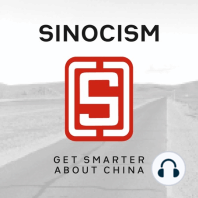47 min listen

An excerpt from Tania Branigan's Red Memory: The Afterlives of China's Cultural Revolution
FromSinocism Podcast
An excerpt from Tania Branigan's Red Memory: The Afterlives of China's Cultural Revolution
FromSinocism Podcast
ratings:
Length:
13 minutes
Released:
May 2, 2023
Format:
Podcast episode
Description
It is my pleasure to be able to run an excerpt from Tania Branigan’s excellent new book “Red Memory: The Afterlives of China's Cultural Revolution”. Tania has also kindly recorded herself reading this chapter, so you can listen to it if you prefer. Tania writes editorials for the Guardian and spent seven years as its China correspondent, reporting on politics, the economy, and social changes. we overlapped in Beijing and became friends. We also recorded a podcast about the book which you can listen to here. You can purchase the book on bookshop.org or on Amazon. The audio edition will be available from Tantor starting 7/11/23 wherever audiobooks are sold.Begin excerpt:Chapter 5Chongqing saw some of the era’s fiercest fighting, with the rift between Red Guards descending into warfare. The Kuomintang had made it their capital while battling the Japanese occupation, and it was home to multiple munitions plants; when armed struggles broke out in 1967, the military backed one side and helped its fighters seize what they needed. The factions battled with grenades, machine guns, napalm, tanks and ships upon the river – everything except planes, a resident recalled.They executed in cold blood too: even the injured, even the pregnant. Tens of thousands fled the city and at least twelve hundred people died, though the true toll was probably much higher. Some were caught in the violence by chance, like the eight-year-old killed by a ricocheting bullet as he played on the street. The others were not so much older, and you could blame chance there too, even if they saw themselves as soldiers. They never thought it would be so serious, that people would die, that so many would die. By the time they saw their friends fall they’d been battling for hours. They were numb; none of it seemed possible. Had it really happened at all?Shapingba Park held the proof. More than five hundred of the victims, mostly teenagers, were buried here, at a Red Guard cemetery hidden on one edge of the site, behind a grove of trees. It was the only Cultural Revolution site in the country to be recognised as a national heritage spot. But a mossy wall surrounded the plot and the public were not allowed in any more. I had come before, and stared through the chained gates. Though the cemetery was only half a century old, it reminded me of the Civil War graveyards I had seen in the American South, crumbling and overgrown. Luxuriant greenery crawled over marble monuments, immense and once stark white but now lichened and grey. Stone torches topped great pillars and obelisks, carved with red stars and Maoist slogans and the number 815. It was the rebel faction the dead had belonged to, named for a critical date in its inception in 1966.‘People began to die on 1 July 1967. On the tenth, I was put in charge of the bodies,’ Zheng Zhisheng recalled. He ran a chemicals business in the city, but back then he had been a student, and they had called him the Corpse Master. He was peering through thick tortoiseshell glasses that still bore the maker’s sticker. Two more dusty pairs lay on his desk, jumbled with books, newspapers, a giant magnifying glass and two lidded porcelain cups. He delved for a photograph. ‘This is October 1967. Twenty-seven people – twenty-seven corpses.’ Most of the faces were turned away from the camera. One mouth gaped so wide it could swallow the viewer.‘I had seen dead bodies when I was young. But I’d never had to handle them. I was a model student, and the faction leader thought I was a helpful person and not afraid of hard work. And also,’ he added, after a moment’s thought, ‘I’d opposed him at the beginning. So he thought of me and put me in charge. I was forced to do it. I put make-up, and an armband, and a Mao badge, on each one. At the start I was afraid of the dirty work. I had to wash the dead bodies and I used soap to wash my hands all the time. Afterwards I didn’t mind about that. The second thing was the smell. The dead bodies stank and I want
Released:
May 2, 2023
Format:
Podcast episode
Titles in the series (8)
Sinocism Podcast #2: Joanna Chiu on her new book China Unbound by Sinocism Podcast